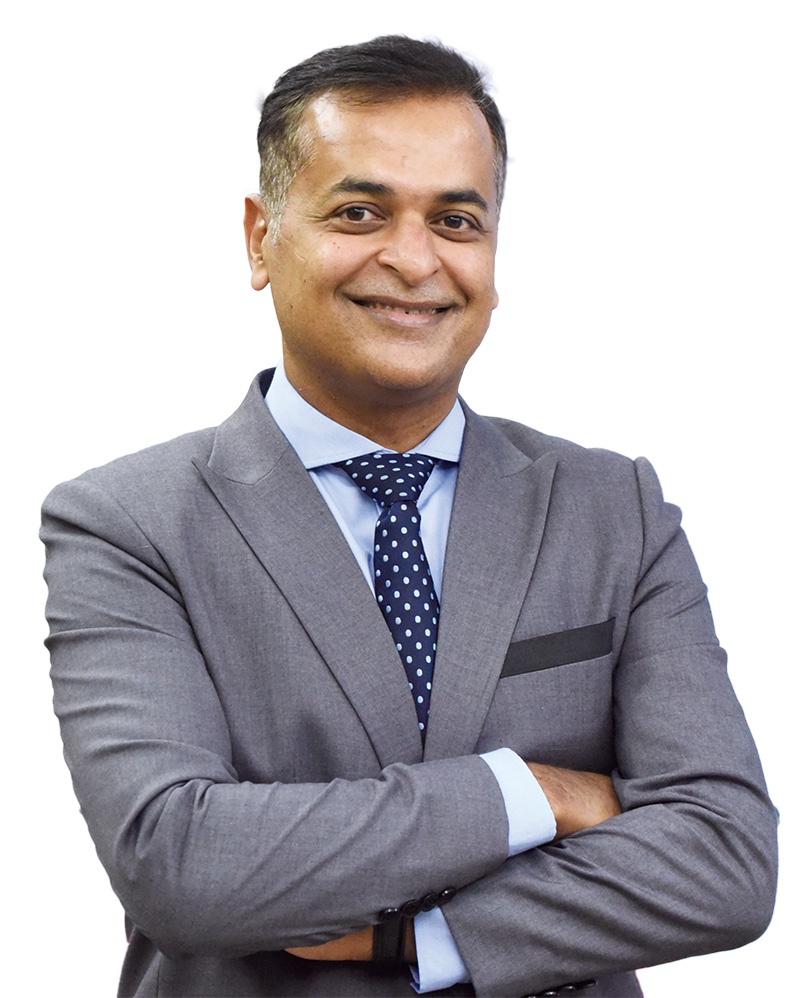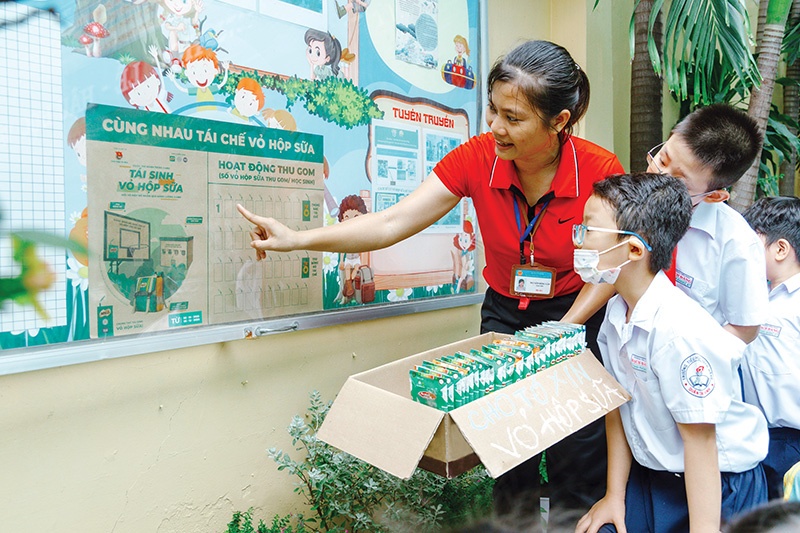Dual crowns for Nestlé in sustainability and HR
 |
| Binu Jacob, CEO of Nestlé Vietnam |
Nestlé Vietnam has just been named the most sustainable enterprise in Vietnam. What do you think made you No.1 for this sustainability award?
This is the third year Nestlé Vietnam has been named among the most sustainable companies in Vietnam by the Vietnam Business Council for Sustainable Development and the first year it has been named No.1, something we are extremely proud of.
I think we have earned this award by the work we have done and by the commitments we have made for the future. On one hand, our holistic approach to sustainability has long set us apart. A lot of companies have flagship programmes on a particular facet of sustainability. All of these are important in their own right, but Nestlé has been pursuing sustainability through several wide-ranging projects that support and reinforce each other.
Nestlé is one of the few companies that have been pursuing sustainability based on the 17 Sustainable Development Goals of the United Nations. While we cannot support each goal to the same extent, it is a framework to channel our thinking and contributions to drive down poverty levels, improve health, and safeguard the planet.
On the other hand, we have made some very strong commitments in 2021, for example, by becoming the first company in Vietnam to announce plans to become plastic neutral by 2025.
This is a massive commitment for only three years. What roadmap will you follow to achieve it?
This is still a moving plan but we are confident we can do it by reducing plastics, establishing partnerships to collect plastics, and creating a market for orphan plastic.
We have already made several commitments to reduce plastics in our products. For example, last year, we decided to make any plastic in our packaging in Vietnam recyclable – and we are now around 95 per cent to completing it.
We are also putting our products under the microscope to reduce our plastic consumption by as much as 33 per cent through research and development. We are already making headways, for example, we have reduced the plastic content of our La Vie bottles by 10 per cent by making them thinner and the caps smaller.
However, being recyclable is not the same as being recycled and there is a dire need for the appropriate systems for collection and reuse. We are supporting this by partnering with companies like TetraPak (for Milo) to see how we can collect back our packaging and repurpose them into useful things. We are also looking for partners who can find a use for orphan plastic.
For instance, in 1,500 schools we encourage children to bring back empty cartons. We segregate the plastics and remake them into basketballs and benches for the schools and communities. This also helps educate children about the importance of recycling. If they start acting now with a sense of purpose and responsibility, the future will be in better hands.
At the same time, regenerative agriculture takes things a step further than net zero. How are you promoting this new approach in Vietnam?
Unfortunately, so much damage has already been done to our environment that simply putting back what we take out is no longer sufficient – we need to regenerate our resources by putting back more.
Agriculture is the second-largest source of greenhouse gas emissions and accounts for 60-70 per cent of Nestlé Group’s emissions. As the largest food company in the world, if we decide to only procure raw materials sourced through regenerative agriculture, farmers will change.
Obviously, this cannot be done overnight, but we have already made a commitment that by 2050, we would only source products that comes from regenerative agriculture. In the short term, we are shooting for 25 per cent by 2025 and 50 per cent by 2030.
Vietnam is our single largest source of coffee and we are already integrating regenerative agriculture into our supply chain here. Our partner farms in Dak Lak and Dalat now intercrop with acacia, pepper, or avocado. It is also part of the education and support we provide local farmers under our NESCAFÉ Plan. It is built into the pragmatic farming skills we teach through our “farmer train farmer” programme. Interestingly, 30 per cent of our farmer trainers are women sharing their personal success with our methods at their farms.
This education is done in collaboration with the Western Highlands Agriculture and Forestry Science Institute, with whom we have also distributed 56 million coffee plantlets in the last 10 years to farmers, which are high-yield and disease resistant, developed specifically for local weather conditions.
The best part is, farmers can make 30-100 per cent more income by adopting regenerative practices and while their immediate coffee output may drop a little, it improves the quality of the yield and will draw more people into farming.
Nestlé Vietnam has also been named as the No.1 Best Place to Work in 2021 in Vietnam by Anphabe, in a particularly difficult year for employment. What do you think has earned you this award?
Nestlé has always been very people-centric. We have higher loyalty levels and people stay with Nestlé longer than with most other companies.
Like in any crisis, COVID-19 presented businesses with a choice between their people and financial targets – and we kept our people priorities.
Of course, we have had many initiatives each week such as wellness activities and we introduced six clubs during the pandemic to keep people connected and positive. But most importantly, our people-centricity was felt a lot more across our organisation during the pandemic.
Every morning, before anything else, we discuss the safety and wellbeing of our people. Almost every week, we were doing town halls to listen to our people and learn what their pain points are. We have created an entire task force to source vaccines for our people and shared our progress and outlooks regularly.
When we had a COVID-19 outbreak at one of our factories, we paid for the best treatment for all involved. We paid VND25 million ($1,000) after each patient, even third-party workers, to transfer them to private hospitals.
It was not about the money; it was about the lives and I think many of our employees felt rather than just heard that we are focused on their wellbeing and that is what has gained us this recognition as the Best Place to Work in Vietnam.
 |
| Nestlé Vietnam supports recycling in 1,500 schools across Vietnam |
How are you planning to retain this position?
We are currently rethinking the workplace of the future. We have set up a team of young people to share with us what the ideal workplace would look like for them. It is a way to get us to leave our comfort zones
The team has already come back with some crazy ideas, which I love. We start from this angle and whittle down to what is practical and possible – and what is inclusive for all ages. Meeting intergenerational expectations post-pandemic will be the single biggest challenge that leaders have faced in the last 10 years. Finding the answer and inciting all of our people to step out of their comfort zones, change, and grow will help us remain the best workplace in Vietnam.
A recurring theme in your sustainability activities is empowering women, which you built into the NESCAFÉ Plan and several other initiatives with the Vietnam Women’s Union. What are you doing to ensure equality within your own organisation?
Globally, women earn 25 per cent less than men for the same jobs in the corporate world, at Nestlé Vietnam they actually earn a little bit more. This has always been in our DNA, so much of the discussion about equality at the workplace and equal pay is a little foreign to us. We have never seen it like that inside Nestlé.
This is not only true for payments. If you look at my own management team, 50 per cent are women, and it is the same at the level below me. Vietnam is one of our best success stories worldwide of women’s empowerment and equality. To some extent, this is also cultural as Vietnamese women are stronger. They are more determined and hardworking, so why should they not reach high?
What the stars mean:
★ Poor ★ ★ Promising ★★★ Good ★★★★ Very good ★★★★★ Exceptional
Related Contents
Latest News
More News
- State corporations poised to drive 2026 growth (February 03, 2026 | 13:58)
- Why high-tech talent will define Vietnam’s growth (February 02, 2026 | 10:47)
- FMCG resilience amid varying storms (February 02, 2026 | 10:00)
- Customs reforms strengthen business confidence, support trade growth (February 01, 2026 | 08:20)
- Vietnam and US to launch sixth trade negotiation round (January 30, 2026 | 15:19)
- Digital publishing emerges as key growth driver in Vietnam (January 30, 2026 | 10:59)
- EVN signs key contract for Tri An hydropower expansion (January 30, 2026 | 10:57)
- Vietnam to lead trade growth in ASEAN (January 29, 2026 | 15:08)
- Carlsberg Vietnam delivers Lunar New Year support in central region (January 28, 2026 | 17:19)
- TikTok penalised $35,000 in Vietnam for consumer protection violations (January 28, 2026 | 17:15)

 Tag:
Tag:




















 Mobile Version
Mobile Version